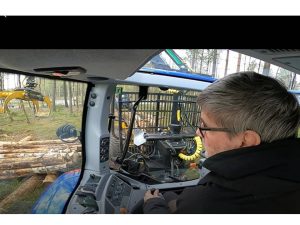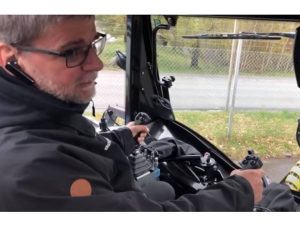As a former forest machine operator, for real forest machines, I have always avoided tractor mounted log trailers with grapple loaders. It´s amazing though, that you never stop learning, and trying. So, despite my respectable age, I have now tried out four log trailers with grapple loaders. Well, loading some logs with them anyway. Surprisingly, two of them were actually close to “real” forest machines.
Testing log trailers with grapple loaders
I have to confess, it wasn´t my idea. The sister-site, Skogsforum.se, was to make live streaming on the theme. Our normal test driver was not available at the time, so they asked me. Luckily for me, I didn´t have to do any loading on the live stream. I tried the four log trailers before we went live and commented it during the actual streaming. However, there will be a film of me loading logs in the forest later.
A new experience
As mentioned above I have never worked, or even tried, any log trailers or grapple loaders. I am used to normal machines, mainly harvesters, and from what I have heard about grapple loaders, they can make folks like me (old stubborn former machine operators) go crazy. So, of course, I had to try it.
When I first learned to operate hydraulic cranes, the normal system was still 5- or 6-lever systems (6 levers if it was a telescope crane). I have always thought that the more modern 2-lever system was rare on grapple loaders. I was looking forward to seeing if I could still operate a crane with 5 or 6 levers. However, I was surprised to find that all the loaders we were to test were equipped with 2-lever systems. I also learned that this is the most common system on log trailers with grapple loaders, at least in Sweden.
Off to the forest
The 4 test rigs had some things in common. Apart from the obvious, that they were mounted on tractors, they also all had frame steering and stabilizer legs. As I didn´t actually drive the machines through the forest I didn´t need the frame steering, but I did use the stabilizer legs.
My job was to load and unload a pile of logs as my colleague filmed me. Afterward, I shared my experiences and views during the live streaming.
Valtra N174 Active with a Moheda M141 4WD log trailer
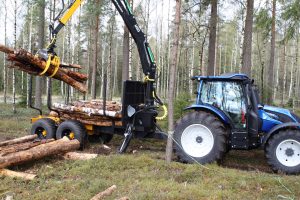
The Valtra N174 Active has a 201 hp engine and is adapted for forest use at the factory.
The first surprise for me was the spacious cab. Ok, it wasn´t like the cabs I am used to, but my prejudices turned out to be wrong. When I sat in the chair, I could easily turn the chair to the working position. I guess that if you have to work in this kind of cab for 8 hours, some more leg space would be nice, but it was ok for me. The cab was equipped with sky view roof which gave a pleasant feeling of space. Of course, a good sight of trees and the crane was given through that window. The downside was the roof part between the rear window and the sky view window that covered to much of the sight.
Next surprise was the crane, a Moheda M60 with a single telescope and 7,5 meters reach. The levers were EHC mini levers to which I am used. But also the crane itself was surprisingly strong and fast. I could easily lift and swing the crane simultaneously and adjust the rotator at the same time. So far, it was very much like I am used to. The crane was strong enough to lift a full grapple at the maximum reach. As the log trailer was empty when I tested that, I had the stabilizing leg down on that side.
The log trailer, Moheda M141 4WD is a 14 tons trailer equipped with Robson driver, rollers, for the drive. It was good and steady, as mentioned above. But I had a problem seeing the bottom of the loading area, it was difficult, almost impossible to see the last logs when unloading. This could be solved by turning the frame steering a bit to the side. Then it was possible to see the last logs on the load.
Valtra N134 Active with a Kesla 144 ND log trailer
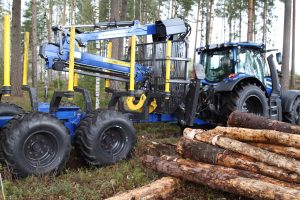
This Valtra was very similar to the N174. It has 145 hp, but the cabin is exactly the same. Sky view window and the same problem with the roof between the rear window and the sky window. Both the N134 and the N174 were equipped with a hydraulic pump for 160 liters/minute which explains the smooth crane maneuverability.
The crane, a Kesla 305T with 8,5 meters double telescope, was controlled with Parker mini levers that also felt familiar. Also very strong and fast. It could easily lift a full grapple at 8,5 meters but just in case, I had the stabilizer leg down also this time.
The log trailer, a Kesla 144 ND with the hydraulic 4-wheel drive was sturdy and gave a reliable impression. On this one I could see the bottom of the loading area without using the frame steering.
This rig was my favorite!
Forwarder feeling
The above mentioned two combinations of a tractor, log trailer with grapple loader / crane had a lot of forwarder feeling. A former forwarder operator would have to get used to the steering, which is quite different, but otherwise, they are very close to “real” forest machines.
Unfortunately, also the prices indicate this. The combination with one of the above-mentioned tractors and 4WD log trailers costs very close to the smallest forwarder. The good thing about this combination is that a tractor could be used for other purposes, which is a limitation for the “real” forest machines.
But there are cheaper alternatives. Below you will find two of them. Now, however, we are definitely moving away from the forwarder feeling.
Valtra A114 Hitech 4 with a Kesla 104 log trailer
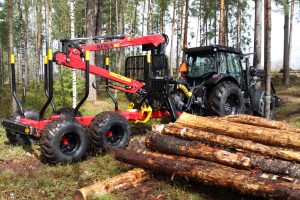
The Valtra A114 has a slightly smaller cabin, but still, it´s possible to turn the chair facing backward. There was no sky view window on this one which made it a bit more claustrophobic. The engine had 110 hp.
The crane, a Kesla 204T with a single telescope and 6,8 meters reach, had hydraulic levers in the cabin. Each lever had a small hydraulic package under it, that had to be pushed away every time the chair was turned forward and pulled back when turning backward to operate the crane. This is something that a former forwarder operator will find difficult to accept.
But the solution is cheap compared to the electric ones on the rigs mentioned above. According to our hosts at the test, this kind of controls are the most common among private forest owners.
The 10-ton log trailer, Kesla 104, had no drive on the wheels. So, it will need a powerful tractor to pull it in the terrain. On this type of log trailer the stabilizer legs are essential. My concern, as a former machine operator, is how often you actually forget to lift them up before moving the machine?
Valtra N124 Hitech with a Moheda M101 4WD log trailer
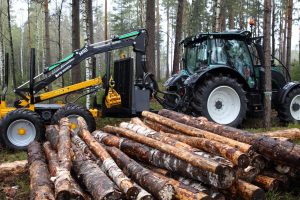
135 hp engine and back to the bigger cabin with sky view. This is a good cab to combinate with a log trailer.
The crane is a Moheda M40 with a single telescope and 6,6 meters reach. The controls for the crane on this one was the same type as on the Kesla 204T, but here they were not moveable like on the Kesla. That meant that they were far away and the working position to operate the crane was very uncomfortable. You had to lean forward to reach them, and to push the buttons for grapple and telescope controls you had to lean even more. So, this was not a solution for long working days.
The log trailer, Moheda M101 4WD, was equipped with a separate hydraulic system that makes it independent of the tractor´s hydraulics and Robson roller driver for the 4WD.
Summary
By now you know that I used to operate forest machines. I guess it´s a bit unfair to compare the kind of units described in this article to traditional forest machines but it is the only comparison I have.
I can imagine that for a farmer that wishes to work in the forest during wintertime as a contractor, the two first described 14-tons log trailers and tractors can be a good option. As they most likely already have the tractor, and have use for it also in farming, the extra investment will only be the trailer. It would be overkill for such a contractor to buy a new forwarder.
The 10-tonners described here are for private forest owners who only work in their own forest, and not as contractors. They are also much cheaper.
Photos: Per Jonsson and Torbjörn Johnsen.
Thanks to our hosts Jon and Algot at Lantmännen Maskin in Värnamo, Sweden.






